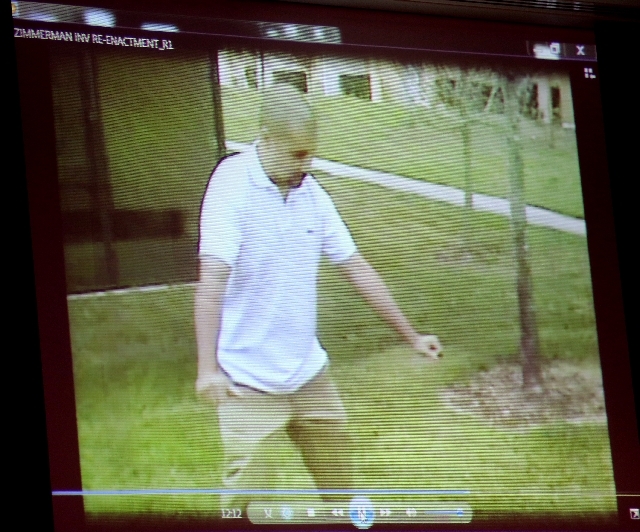Expert: No Martin DNA on gun grip

SANFORD, Fla. — Trayvon Martin’s DNA was not found on the grip of George Zimmerman’s gun, and Zimmerman’s DNA was not found under the unarmed teen’s fingernails, a law enforcement expert said Wednesday in testimony that prosecutors hope will refute the neighborhood watch volunteer’s self-defense claim.
Zimmerman has pleaded not guilty to second-degree murder and says he shot the 17-year-old in the chest to protect himself as Martin reached for his firearm during a fight.
Prosecutors called Florida Department of Law Enforcement DNA expert Anthony Gorgone’s testimony came on the same day prosecutors presented evidence about Zimmerman’s work in a college criminal justice course, which they say shows the neighborhood watch volunteer knew about Florida’s self-defense law and had aspirations of becoming a police officer.
Florida Department of Law Enforcement analyst Amy Siewert also testified that tearing and residue on Martin’s clothing showed the gun was directly against him when it fired.
Prosecutors have sought to portray Zimmerman as a vigilante who profiled Martin as the teen walked home on a rainy night.
Zimmerman had maintained in an interview with Fox News last year that he did not know about the law. Prosecutors say he did have knowledge of it, however, because the subject was covered in the college class. They called as a witness Alexis Francisco Carter, the military attorney who taught Zimmerman’s class that covered Florida’s stand-your-ground law, which says a person has no duty to retreat and can invoke self-defense in killing someone if it is necessary to prevent death or great bodily harm. Carter described Zimmerman as one of his better students and said the neighborhood watch volunteer got an “A” in his class.
Under cross-examination, Carter gave two definitions of legal concepts that seemed to bolster the defense’s case. He explained that a person can make a self-defense argument if the person has a “reasonable apprehension” of death or great bodily harm.
“It’s imminent fear. The fact alone that there isn’t an injury doesn’t necessarily mean that the person didn’t have a reasonable apprehension or fear,” Carter said. “The fact that there are injuries might support there was reasonable apprehension and fear.”
Carter also explained the concept of “imperfect self-defense,” when a person is being threatened but then counters with a force disproportionately greater than the force used against them.
“They would have the right to defend themselves?” said defense attorney Don West.
“Right,” Carter said.
Another instructor, Seminole County State College professor Scott Pleasants, testified that Zimmerman had taken his online criminal justice class. Pleasants’ testimony via Skype from Colorado, broadcast live on television, was interrupted when he started getting inundated with Skype calls.
Judge Debra Nelson also ruled Wednesday that prosecutors can show the jury Zimmerman’s job application to a police agency in 2009 and his application to ride around with Sanford police in 2010. The judge indicated prosecutors would be resting their case Wednesday.
Lt. Scott Kearns of the Prince William County Police Department in Virginia testified that Zimmerman wasn’t initially hired because of a less-than-stellar credit history.
Zimmerman is charged with second-degree murder in the shooting death of 17-year-old Trayvon Martin last year. Martin was black; Zimmerman identifies as Hispanic. The case sparked nationwide protests and touched off a debate about race and self-defense.
Prosecutors said Zimmerman’s ability to understand criminal investigations and desire to be a police officer doesn’t show wrongdoing, but is relevant to Zimmerman’s state of mind on the night Martin was killed.
“He has applied to be a police officer before, he still wants to be one, according to some of his homework assignments…this wasn’t some sort of passive thing,” said prosecutor Richard Mantei, who noted Zimmerman took a course on how to be a good witness and expressed a desire to go on police ride-alongs. “This is simply a fact the jury ought to know.”
When he was interviewed by detectives, Zimmerman spoke “in written police jargon” and talks about “justifiable use of force” and says he “unholstered my firearm, not I pulled my gun,” Mantei said.
Defense attorneys believe the items are irrelevant and asked the judge not to allow them.
Defense attorney Mark O’Mara said Tuesday that if prosecutors start bringing up Zimmerman’s past, the defense will dig into Martin’s past, including fights. The judge had ruled previously that Martin’s past fights, drug use and school records couldn’t be mentioned in opening statements.
“There is no relevance and the suggested relevance will be far more outweighed by the prejudice,” O’Mara said of the evidence admitted Wednesday.
—
Follow Kyle Hightower on Twitter at HTTP://WWW.TWITTER.COM/KHIGHTOWER .
Follow Mike Schneider on Twitter at HTTP://TWITTER.COM/MIKESCHNEIDERAP .